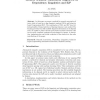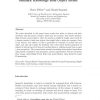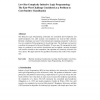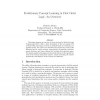123
click to vote
ICMLA
2010
14 years 11 months ago
2010
Abstract--In the Relational Reinforcement learning framework, we propose an algorithm that learns an action model allowing to predict the resulting state of each action in any give...
130
click to vote
SEMWEB
2010
Springer
14 years 12 months ago
2010
Springer
In this paper we present a method for semantic annotation of texts, which is based on a deep linguistic analysis (DLA) and Inductive Logic Programming (ILP). The combination of DLA...
113
Voted
RAS
2008
15 years 1 months ago
2008
The robot described in this paper learns words that relate to objects and their attributes and also learns concepts, which may be recursive, that involve relationships between sev...
104
click to vote
CORR
2002
Springer
15 years 1 months ago
2002
Springer
The Inductive Logic Programming community has considered proof-complexity and model-complexity, but, until recently, size-complexity has received little attention. Recently a chal...
116
click to vote
ML
2006
ACM
15 years 2 months ago
2006
ACM
Many domains in the field of Inductive Logic Programming (ILP) involve highly unbalanced data. A common way to measure performance in these domains is to use precision and recall i...
106
click to vote
CORR
2007
Springer
15 years 2 months ago
2007
Springer
This paper describes experiments on learning Dutch phonotactic rules using Inductive Logic Programming, a machine learning approach based on the notion of inverting resolution. Di...
123
click to vote
AICOM
2006
15 years 2 months ago
2006
This paper presents an overview of recent systems for Inductive Logic Programming (ILP). After a short description of the two popular ILP systems FOIL and Progol, we focus on meth...
102
click to vote
BMCBI
2008
15 years 2 months ago
2008
This paper describes the use and customization of Inductive Logic Programming (ILP) to infer indexing rules from MEDLINE citations. Preliminary results suggest this method may enh...
106
click to vote
ICONIP
1998
15 years 3 months ago
1998
This paper presents a method to induce relational concepts with neural networks using the inductive logic programming system LINUS. Some first-order inductive learning tasks taken...
106
click to vote
FLAIRS
2001
15 years 3 months ago
2001
We introduce the graph-based relational concept learner SubdueCL. We start with a brief description of other graph-based learning systems: the Galois lattice, Conceptual Graphs, a...




